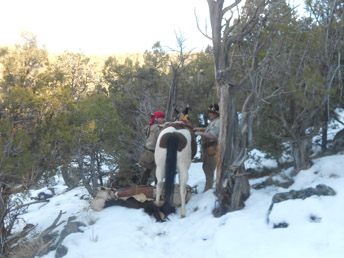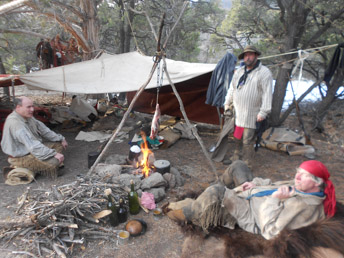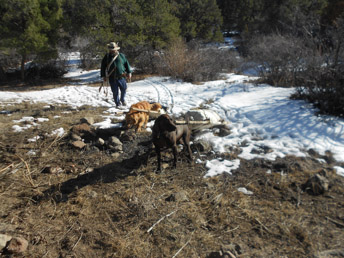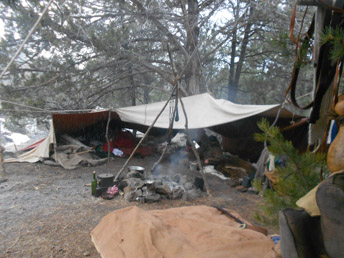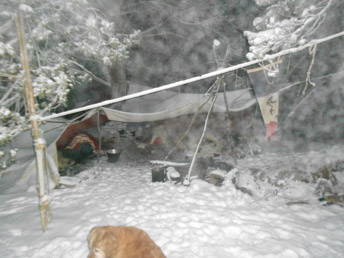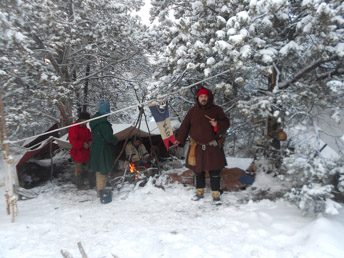Rocky Mountain Outfit — American Mountain Men (AMM) party of Colorado
Report on AFCo Party Along the Kannah Creek
Friday, January 20th, 2012 AD
Messier,
I have caught up with a party of AFCo men twenty miles south from where the Grand river comes out of the mountains. The river itself was covered with ice at the canyon just before the great ford that the Ute thought me to use as a safe one any time of the year. There were five men and I have joined them on their way up the hills to get into a wintering camp. The soil was red and wet on the north sides, but gave us not much trouble. Animals were loaded and we started uphill. The climb was steep, but we made it after several mishaps along the way. On one of the animals the pack saddle was on a small side, and it slid off the side of the horse two times. Luckily, the pack horse was calm and stayed in place until the party men repacked and secured the load.
Once we got into the camping area, we have made several shelters out of pack covers and other tarp pieces we had. The weather was nice and we did not expect any trouble from rain or snow. Even though this is on the edge of the Shining Mountains, the winter in these parts is usually mild and a lot of AFCo parties winter along the Tomichi, Uncompagre and Arkansas rivers. Those men claim that they have been wintering in these parts for seven years.
Fire was started and some cooking for the supper. I hade with me a goat rear leg from the animal I shot a few days ago and we roped it on the tripod to cook and get smoked on the fire. Food that the party had is simple, but nutritious, dried meat, blues corn flour that they obtain from St Afee and Tahos, some dry fruit, and they hunt for fresh meat every day. This country had a lot of mountain buffaloes, elk and deer, and I have seen some bear sign form the past fall along the creek. Trappers are well fed and merry, and have an easy winter compared to your men up north.
I was surprised to see a man with travois on two dogs come in the camp. He is an old Norwesterner who moved to these parts several winters ago. He uses his dogs to pull his possebles, and to my surprise he hat a real tent stored on one of the travois. He set up his tent and I could not but think that it would be nice to spend a night like that under the real cover, compared to shanties and covers we build and use and always get more wet under them that under a tree when it rains and snows.
We had a pleasant night, they shared with me their shrub and I liked it very much, so I pulled my own bottle and we drunk it all. They have some citrus juice in their shrub, probably from New Mexico, and it tastes very, very good.
After we turned in, I have checked if they post a guard for the stock and camp, but they did not bother as there can only be their friends Utes in the area, and they do not steel like the northern tribes. I did not tell them about the trail of approx forty Indians that I have followed along the Grand river from Ute Pass for three days. They did have their arms close by their beds, and they all have rifles and are crack shots with them, so they say.
Saturday, January 21st
After a surprisingly mild night, we awoke to sunshine and made a breakfast out of blue corn flour, raisins, dry berries and fresh meat that one of their hunters (who was not with us overnight) brought in. After the breakfast we spent some time adjusting our beds and covers, as it seemed that the clouds from the west are bringing storms. Several men went out to scout the area; others were hanging around the camp, talking, playing cards and telling stories. It seems to me that they mostly stay in this country, as their hunting of beaver along the Tomichi and Grand rivers is rich, and trading with Utes is peaceful and bountiful. They had sent 26 packed horses with eight of their men south to Arkansas river and trails along it to the east. I do not know of those trails and how to get there, but will try to get the information from those friendly trappers and send you with other letter once I get to Francis and Pierre in St Afee.
Rain started around noon, with wind picking up from the west. The hunters that were out returned and we all gathered around fires and spent time talking and playing cards.
I had a chance to talk to a big Norwesterner, and found out that he is their gunsmith and main cook, they have three hunters and the rest are trappers. The party leader keeps everybody together, they all have their duties in camp and on trail and everybody seems to be merry and happy. On and off raining did not stop the men to tend to their duties, and I had a chance to observe their routines and will write you more about that from St Afee. They gathered more wood for several days, as the storm became more windy and wet ground was not easy to move on. Their animals were gathered under big trees where they were protected from wind and rain, and they have some special food that they feed them due to absence of good pasture in the hills.
They have told me that higher in the hills and mountains there are a lot of creeks and small lakes full of beaver, and they catch river fish in them too. Hunting ground is shared with Utes who do not protest them being here and hunting here, as there are not too many of them. If you send your men to those parts, there may be trouble both with the AFCO and with the Utes, as they will learn and realize that this is just the beginning of the white hunters and trappers coming in their land. Any party of less than two dozen armed men can easy be overrun by the Ute parties, as they do have Mexican muskets and those men trade powder and lead to Utes for furs. Your men have to bring gifts and trade goods and try to trade more in the beginning, before they go trapping.
Evening and night were like the previous day’s, fun, laughter, stories, shrub, and as we turned in our bed, rain started to slash.
Sunday, January 22nd
It snowed all night and wind pushed snow in every shelter from every side. I woke up at daylight and found camp enclosed in white blanket.
Dogs greeted me, and everybody else was asleep. I though of those tracks along the Grand river and was happy that this camp is very secluded in the hills and our fire could not be seen form the valley below.
I started the fire with some dry branches I kept under my bedroll and soon other men got up. Keeping the wet wood around the fire to dry, we managed to keep the fire going for some coffee and breakfast. Snow stopped and sun started to melt it and make ground more wet and more difficult for travel. I knew that the men will leave for the hunt soon, I helped them pack their gear, I packed my horse and announced that I too will go south with some of them, toward the St Afee. Every men gathered some of their possebeles, and the rest was put together with big pack bales on horses and mules and we left the area. Campground was cleaned, tracks brushed so nobody could tell how many peole were in the camp, fire was put down and we parted our ways. Some of them went east, some west, and two of them went with me toward St Afee.
Messier, I will tell you that this is a company of men who know their business, they know their equipment, the land where they hunt and it will be risky and hard to penetrate their hunting and trapping grounds. They proudly display their company’s flag everywhere and the Indians know that men with that flag are trading fair with them and would not harm the bearer of that flag. For now. I will write you more when I get to St Afee.
Until then, I stay in your service and pray to Mary and all Saints that you and your family stay well and safe.
YHS,
Jean Baptiste Darko
